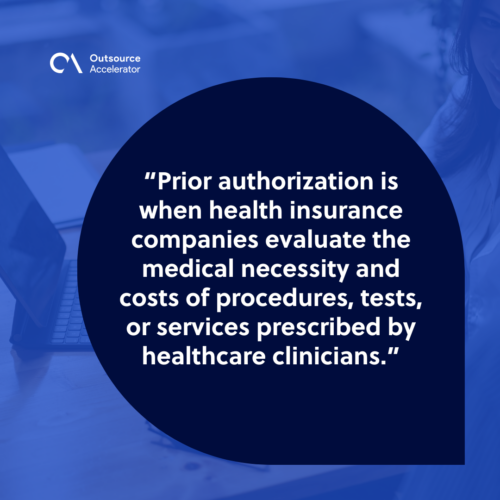Prior authorization: What it is and how it can help you

Before patients can avail of a medical service, such as a prescription or a procedure, there are times when it must first be approved by the health plan before they can pay for it.
This process, called prior authorization, ensures that medical services are eligible to be covered by a health insurance company.
Continue reading to learn the benefits, process, and what kind of treatments may require prior authorization.
What is prior authorization?
Prior authorization is when health insurance companies evaluate the medical necessity and costs of procedures, tests, or services prescribed by healthcare clinicians.
Health insurance companies need prior authorization to check if a certain medical prescription or procedure is necessary and worth the cost before deciding to cover it.
Once the service is approved, the health insurance company can deem it eligible to be included in their health plan. Like all businesses, health insurers must ensure their funds are being used for a worthwhile cause.

How does the prior authorization process work?
The process for prior authorization may vary depending on the medical service.
Some services take longer to process due to external factors such as the amount of manual work done and the payer’s requirements.
The general process can be broken down into the following steps:
Determine the kind of service required
The first step is when the healthcare provider prescribes the patient with the service needed for his/her medical condition.
The healthcare provider must verify if the said service will require prior authorization.
Submission of formal authorization request
If required, the provider will submit a formal authorization request and sign it to confirm and support the medical service’s legitimacy.
Sometimes, the healthcare provider will contact the health insurer directly and explain why they recommended a specific service to the patient.
This service will then be reviewed by the insurance company’s healthcare professionals, nurses, and physicians.
If everything is in accordance with the health plan’s rules and conditions, the health insurer will approve the request.
Otherwise, if the request is denied, the patient and healthcare provider can submit a letter of appeal along with whatever supporting documents they have.
Finalizing payment and specifics
Once the health insurer approves the prior authorization request, the payment details will be finalized. The medical bill can either be split between the patient and the insurer, or the insurer covers the whole thing.
Additionally, the healthcare provider will have to gather specific information about the medical service, such as the CPT code of the specific service.
Benefits of prior authorization
One key benefit to prior authorization is that the patient does not have to cover the full cost of their medical service and can rely on the health insurance company to cover it.
Managing costs is also a good thing for the insurer as it ensures that their funds are being put to good use and they are paying for a medically necessary service.
Prior authorization is also good for rationing health care as it ensures they are paying for a drug or service most appropriate for the patient.
Challenges of prior authorization
Prior authorization comes with a few setbacks, which could waste valuable time on both the patient’s and healthcare provider’s part.
One issue is that prior authorization takes time for the insurer to approve the provider’s request.
Patients needing urgent medical services may lose precious time waiting for their insurers’ approval. This delay results in more complications and burdens on patients and the providers.
Additionally, there is the risk of requests getting rejected by the insurers if they think the medical service is not worth the cost. It would lead to patients shouldering all the expenses.

Medical treatments that may require prior authorization
Prior authorization is usually done for non-emergency situations to give the health insurers more time to process.
Prescription drugs or medication are the most common types of service that require prior authorization. Health insurers must determine if the drug is truly necessary and the best option for a situation.
In the meantime, while they process their decision, they may authorize a short-term supply of medication.
A health insurer may require prior authorization for drugs or medication that:
- Have serious side effects
- Have a high risk of misuse or addiction
- Are used for cosmetic purposes instead of medical purposes
- May be harmful when taken with other medications
- Are expensive when there are cheaper alternatives
Additionally, prior authorization may also be required for bigger and more expensive procedures, such as:
- Diagnostic imaging (e.g., MRIs, CT scans, or PET scans)
- Durable medical equipment (e.g., oxygen tanks, wheelchairs, canes, beds, or crutches)
- Rehabilitation
- Home health services
- Non-emergency surgery (e.g., elective surgery)
Outsource prior authorization with Connext
Healthcare businesses can outsource their pre-authorization process or prior approvals to Connext.
Connext has seasoned prior authorization specialists who can handle functions such as:
- Submitting requests
- Tracking progress with insurance companies
- Performing online checks
- Verifying information via phone fax
- Reviewing clinical data
- Requesting additional documentation
Connect with Connext to learn more about its featured services and pricing!







 Independent
Independent




